2017年中考英语二轮语法专题复习课件之情态动词
文档属性
| 名称 | 2017年中考英语二轮语法专题复习课件之情态动词 |

|
|
| 格式 | zip | ||
| 文件大小 | 219.4KB | ||
| 资源类型 | 教案 | ||
| 版本资源 | 通用版 | ||
| 科目 | 英语 | ||
| 更新时间 | 2017-01-07 21:54:24 | ||
图片预览

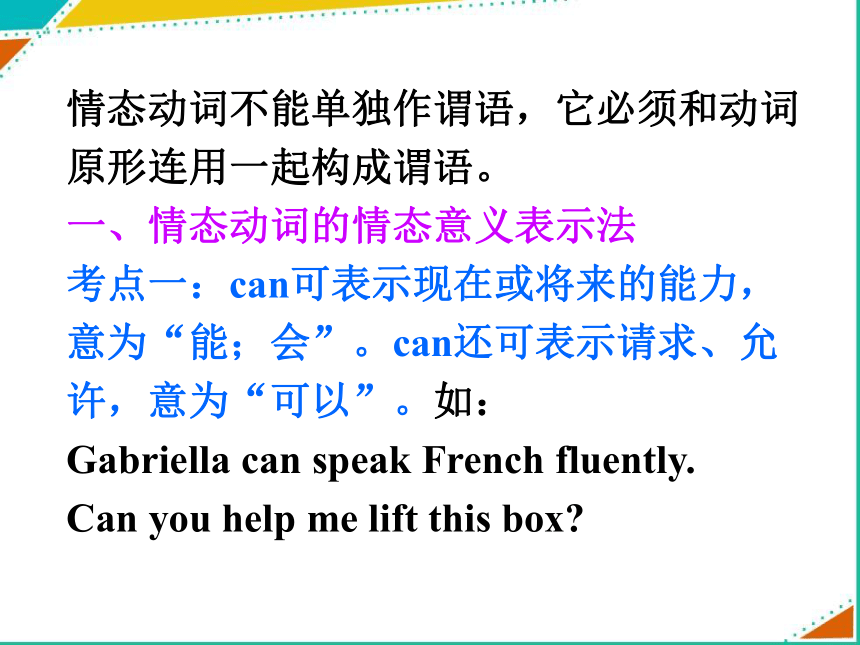
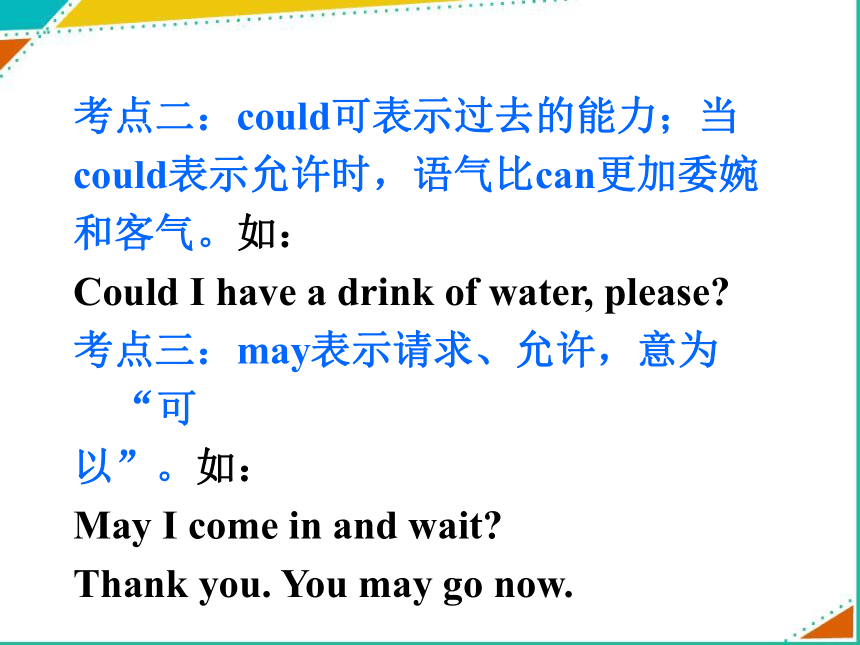
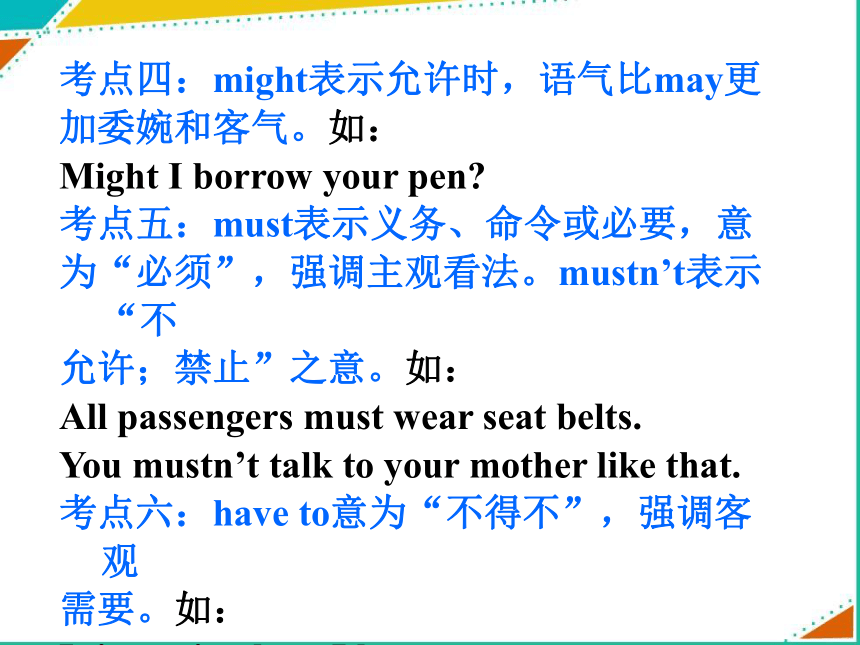
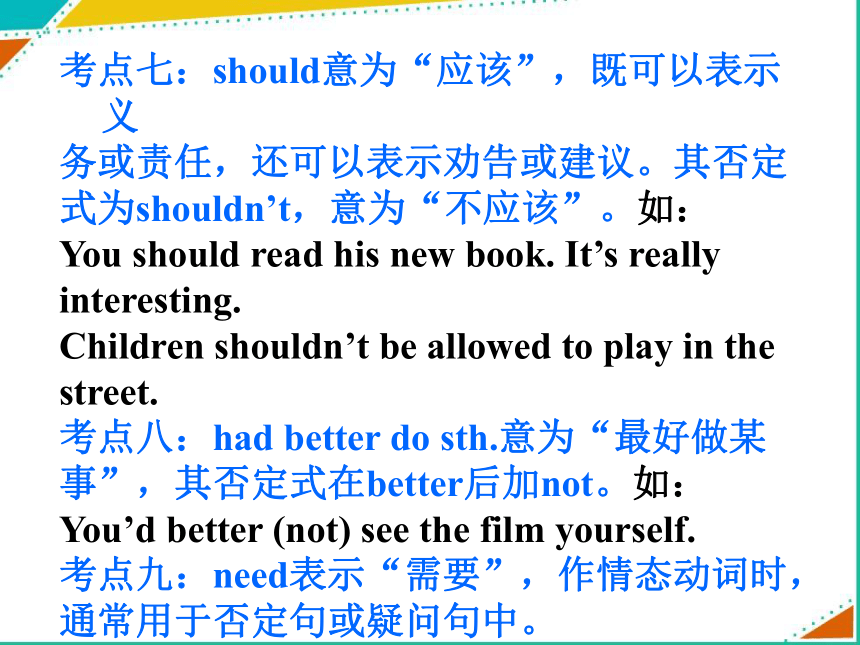
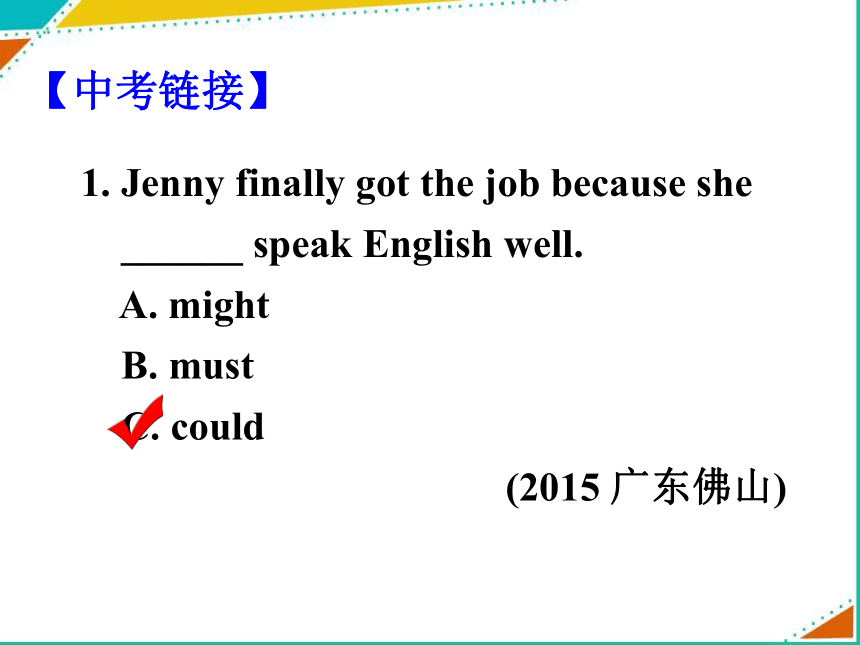
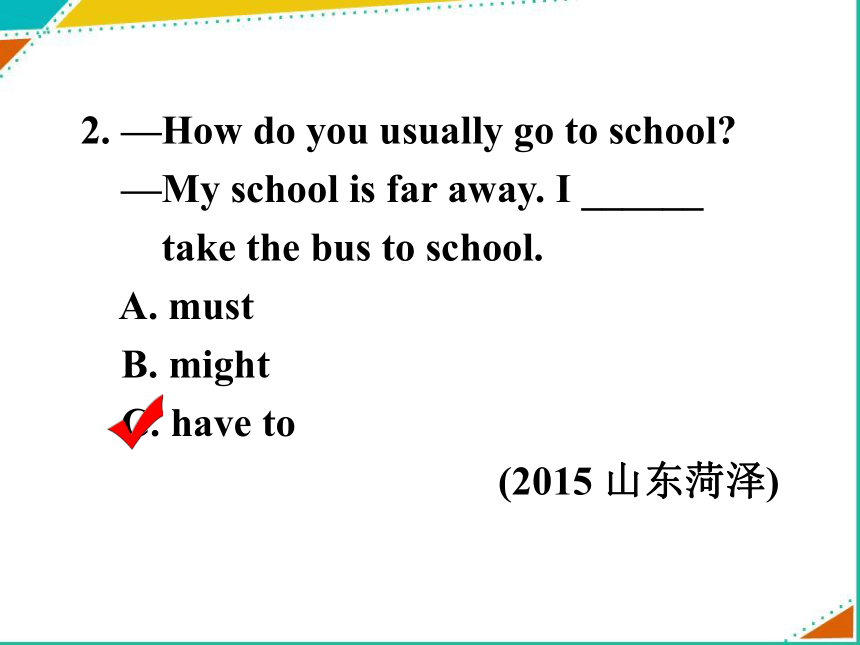
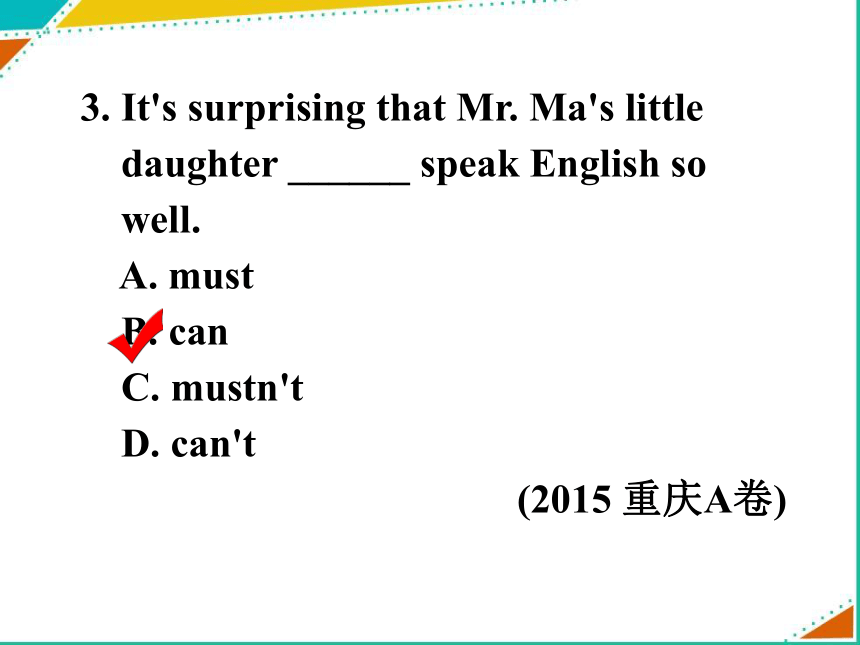
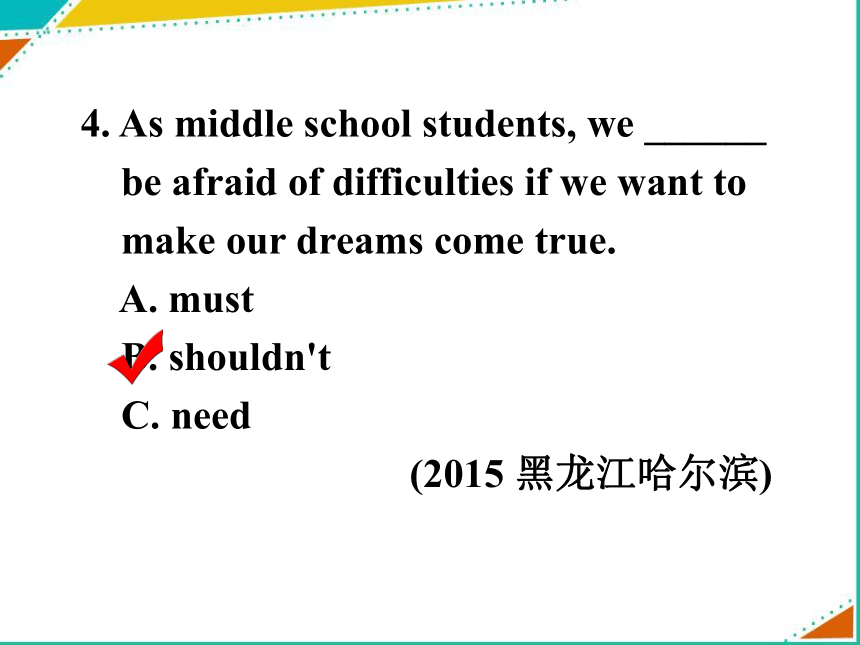
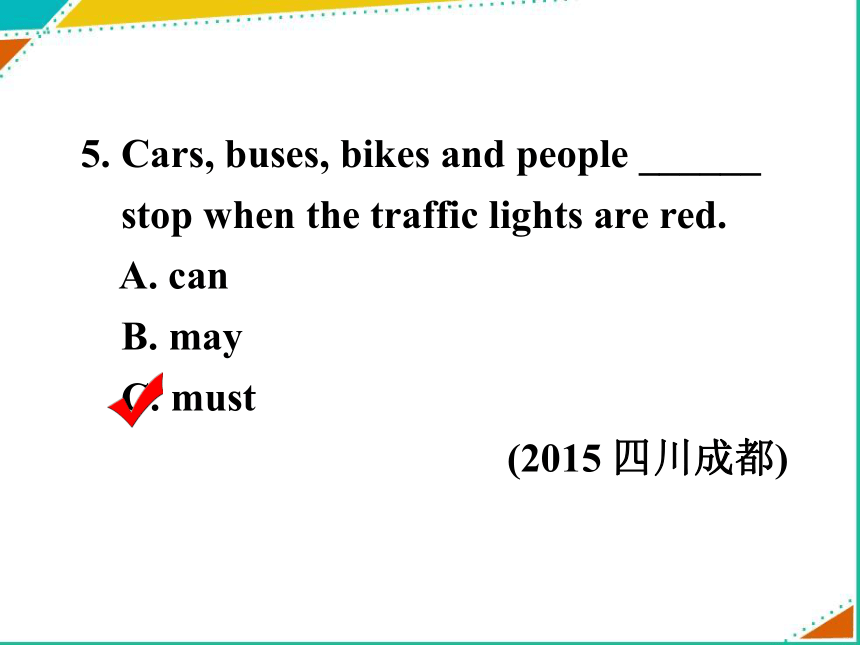
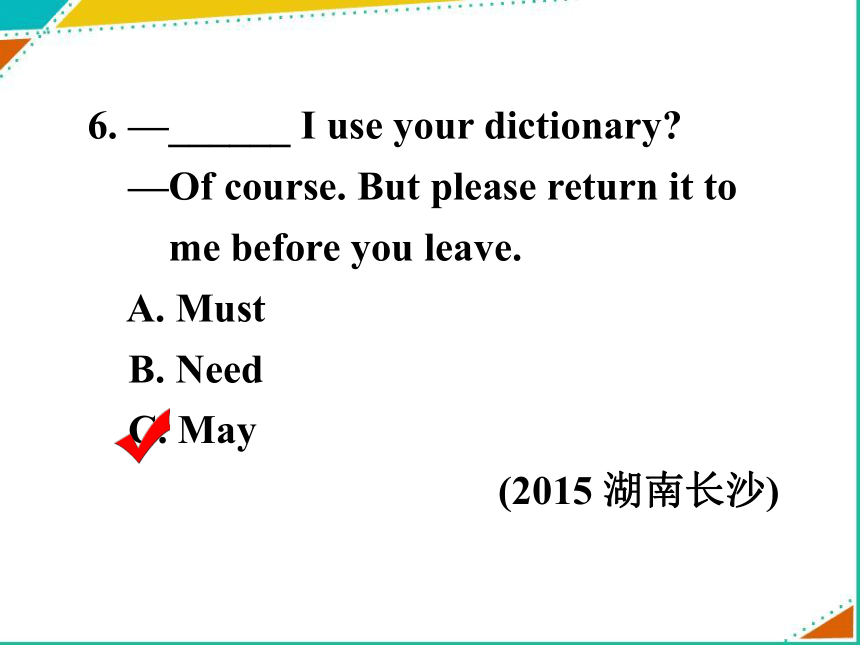
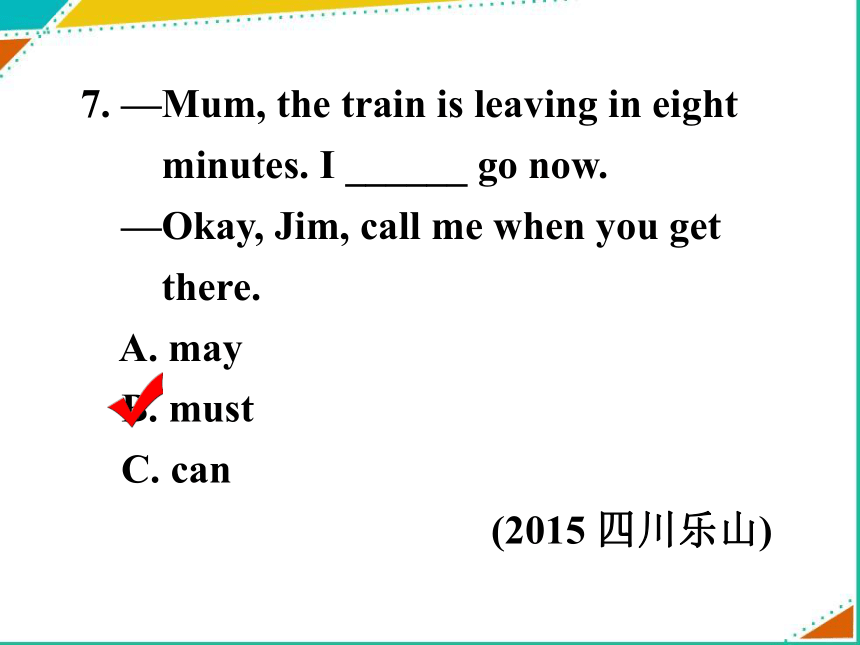
文档简介
课件36张PPT。情态动词情态动词不能单独作谓语,它必须和动词
原形连用一起构成谓语。
一、情态动词的情态意义表示法
考点一:can可表示现在或将来的能力,
意为“能;会”。can还可表示请求、允
许,意为“可以”。如:
Gabriella can speak French fluently.
Can you help me lift this box?考点二:could可表示过去的能力;当
could表示允许时,语气比can更加委婉
和客气。如:
Could I have a drink of water, please?
考点三:may表示请求、允许,意为“可
以”。如:
May I come in and wait?
Thank you. You may go now.考点四:might表示允许时,语气比may更
加委婉和客气。如:
Might I borrow your pen?
考点五:must表示义务、命令或必要,意
为“必须”,强调主观看法。mustn’t表示“不
允许;禁止”之意。如:
All passengers must wear seat belts.
You mustn’t talk to your mother like that.
考点六:have to意为“不得不”,强调客观
需要。如:
It is getting late. I have to go.考点七:should意为“应该”,既可以表示义
务或责任,还可以表示劝告或建议。其否定
式为shouldn’t,意为“不应该”。如:
You should read his new book. It’s really
interesting.
Children shouldn’t be allowed to play in the
street.
考点八:had better do sth.意为“最好做某
事”,其否定式在better后加not。如:
You’d better (not) see the film yourself.
考点九:need表示“需要”,作情态动词时,
通常用于否定句或疑问句中。【中考链接】 1. Jenny finally got the job because she
______ speak English well.
A. might
B. must
C. could
(2015 广东佛山)2. —How do you usually go to school?
—My school is far away. I ______
take the bus to school.
A. must
B. might
C. have to
(2015 山东菏泽)3. It's surprising that Mr. Ma's little
daughter ______ speak English so
well.
A. must
B. can
C. mustn't
D. can't
(2015 重庆A卷)4. As middle school students, we ______
be afraid of difficulties if we want to
make our dreams come true.
A. must
B. shouldn't
C. need
(2015 黑龙江哈尔滨)5. Cars, buses, bikes and people ______
stop when the traffic lights are red.
A. can
B. may
C. must
(2015 四川成都)6. —______ I use your dictionary?
—Of course. But please return it to
me before you leave.
A. Must
B. Need
C. May
(2015 湖南长沙)7. —Mum, the train is leaving in eight
minutes. I ______ go now.
—Okay, Jim, call me when you get
there.
A. may
B. must
C. can
(2015 四川乐山)8. You ______ return the book now.
You can keep it until next week if
you like.
A. have to
B. can't
C. mustn't
D. needn't
(2015 山东青岛)9. —You ______ park here! Look at the
sign, it says “No parking”.
—Sorry, I didn't notice that sign just
now.
A. won't B. needn't
C. mustn't D. couldn't
(2015 江苏苏州)二、情态动词表示推测
考点一:can表示推测时常用于否定句
中,此时can’t意为“不可能”。如:
That can’t be his mother. She’s not that
old.
考点二:could常用于肯定句中,表示不
确定的推测,意为“可能”。如:
You could be right, but I don’t think you
are.考点三:may表示推测,意为“可能;也许”。
如:I may be late, so don’t wait for me.
考点四:might表示推测时,比may的可能性
更小。?如:
She might not want to come with us, I guess.
考点五:must表示推测时常用于肯定句中,
表示很有把握的推测,意为“一定”。如:
The machine doesn’t work. There must be
something wrong with it.1. —Look! It ______ be David in the classroom.
—It ______ be him. Because I saw him in the library a moment ago.
A. may; mustn't B. must; can't
C. can; can't D. mustn't; can
(2015 四川广安)【中考链接】 2. Harry's been driving all day — he ______ be tired.
A. need
B. can
C. shall
D. must
(2015 浙江杭州)3. —Look! The man at the gate ______ be our headmaster. He is always standing there every morning.
—No, it ______ be him. He is holding a meeting in the office now.
A. must; can't B. must; mustn't
C. can't; can't D. can't; mustn't
(2015 山东滨州)4. —I have been to the moon twice.
—You ______ be joking! It's impossible!
A. can
B. may
C. must
D. need
(2015 山东潍坊)5. —Do you have any plans for this Sunday?
—I'm not sure. I ______ go to the countryside to see my grandmother.
A. can
B. must
C. may
D. need
(2015 安徽)6. —Will Karen come to our party?
—She hasn't decided yet. She ______ come.
A. need
B. must
C. may
D. has to
(2015 山东聊城)7. The green dictionary ______ belong to ______. Her name is on it.
A. may, Carla's
B. must, Carla
C. can't, Carla
D. must, Carla's
(2015 四川南充)8. —Do you have any plans for this summer vacation?
—I'm not sure. I ______ take a trip to Taiwan.
A. must B. need
C. may D. should
(2015 江苏盐城)9. Life is changeable. No one knows what ______ happen in the future.
A. should
B. need
C. have to
D. might
(2015 山东莱芜)三、情态动词一般疑问句的回答
考点一:may表示请求时,用于主语为
第一人称的一般疑问句中,其否定回答
不用may not,而用mustn’t或can’t。
如:
—May I use your glasses for a few
minutes?
—No, you mustn’t / can’t.考点二:
在回答由must引起的一般疑问句时, 肯
定回答常用must, 否定回答常用
needn’t或don’t have to,表示“不必”。
如:
—Must we finish this project today?
—Yes, you must. / No, you needn’t / don’t have to.考点三:在回答由need引起的一般疑问句时,肯定回答用must,否定回答用needn’t。如:
—Need I bring you a coat?
—Yes, you must. / No, you needn’t.
考点四:在回答由could(表示委婉语气)引起的一般疑问句时,常用can / can’t回答。1. —Must I finish all the homework this evening?
—No, you ______. Tomorrow is Saturday, and you have enough time for it.
A. mustn't B. needn't
C. won't D. can't
(2015 江苏连云港)【中考链接】 2. A: Mum, may I go out to play football for an hour?
B: No, you ______. The air outside is not very clean.
A. can't
B. needn't
C. couldn't
(2015 贵州遵义)3. —Must I hand in the exercise book today, Miss Green?
—No, you ______. Take your time. Just tomorrow.
A. shouldn't B. needn't
C. mustn't D. can't
(2015 四川内江)4. —Must I sing the song in Russian?
—No, you ______. It's up to you.
A. mustn't
B. can't
C. don't
D. needn't
(2015 四川资阳)5. —Can you come to my party on Wednesday?
—Sorry, I ______. I have a piano lesson.
A. can't
B. couldn't
C. mustn't
(2015 黑龙江绥化)6. —______ I complete the composition today, sir?
—No, you needn't. You may ______ tomorrow morning.
A. Can, hand it in
B. May, hand in it
C. Must, hand it in
D. Need, hand in it
(2015 山东烟台)7. —Could you please sweep the floor, Tom?
—Sorry, mum, I ______. I'm doing my homework.
A. can't B. mustn't
C. needn't D. may not
(2015 湖北荆门)
原形连用一起构成谓语。
一、情态动词的情态意义表示法
考点一:can可表示现在或将来的能力,
意为“能;会”。can还可表示请求、允
许,意为“可以”。如:
Gabriella can speak French fluently.
Can you help me lift this box?考点二:could可表示过去的能力;当
could表示允许时,语气比can更加委婉
和客气。如:
Could I have a drink of water, please?
考点三:may表示请求、允许,意为“可
以”。如:
May I come in and wait?
Thank you. You may go now.考点四:might表示允许时,语气比may更
加委婉和客气。如:
Might I borrow your pen?
考点五:must表示义务、命令或必要,意
为“必须”,强调主观看法。mustn’t表示“不
允许;禁止”之意。如:
All passengers must wear seat belts.
You mustn’t talk to your mother like that.
考点六:have to意为“不得不”,强调客观
需要。如:
It is getting late. I have to go.考点七:should意为“应该”,既可以表示义
务或责任,还可以表示劝告或建议。其否定
式为shouldn’t,意为“不应该”。如:
You should read his new book. It’s really
interesting.
Children shouldn’t be allowed to play in the
street.
考点八:had better do sth.意为“最好做某
事”,其否定式在better后加not。如:
You’d better (not) see the film yourself.
考点九:need表示“需要”,作情态动词时,
通常用于否定句或疑问句中。【中考链接】 1. Jenny finally got the job because she
______ speak English well.
A. might
B. must
C. could
(2015 广东佛山)2. —How do you usually go to school?
—My school is far away. I ______
take the bus to school.
A. must
B. might
C. have to
(2015 山东菏泽)3. It's surprising that Mr. Ma's little
daughter ______ speak English so
well.
A. must
B. can
C. mustn't
D. can't
(2015 重庆A卷)4. As middle school students, we ______
be afraid of difficulties if we want to
make our dreams come true.
A. must
B. shouldn't
C. need
(2015 黑龙江哈尔滨)5. Cars, buses, bikes and people ______
stop when the traffic lights are red.
A. can
B. may
C. must
(2015 四川成都)6. —______ I use your dictionary?
—Of course. But please return it to
me before you leave.
A. Must
B. Need
C. May
(2015 湖南长沙)7. —Mum, the train is leaving in eight
minutes. I ______ go now.
—Okay, Jim, call me when you get
there.
A. may
B. must
C. can
(2015 四川乐山)8. You ______ return the book now.
You can keep it until next week if
you like.
A. have to
B. can't
C. mustn't
D. needn't
(2015 山东青岛)9. —You ______ park here! Look at the
sign, it says “No parking”.
—Sorry, I didn't notice that sign just
now.
A. won't B. needn't
C. mustn't D. couldn't
(2015 江苏苏州)二、情态动词表示推测
考点一:can表示推测时常用于否定句
中,此时can’t意为“不可能”。如:
That can’t be his mother. She’s not that
old.
考点二:could常用于肯定句中,表示不
确定的推测,意为“可能”。如:
You could be right, but I don’t think you
are.考点三:may表示推测,意为“可能;也许”。
如:I may be late, so don’t wait for me.
考点四:might表示推测时,比may的可能性
更小。?如:
She might not want to come with us, I guess.
考点五:must表示推测时常用于肯定句中,
表示很有把握的推测,意为“一定”。如:
The machine doesn’t work. There must be
something wrong with it.1. —Look! It ______ be David in the classroom.
—It ______ be him. Because I saw him in the library a moment ago.
A. may; mustn't B. must; can't
C. can; can't D. mustn't; can
(2015 四川广安)【中考链接】 2. Harry's been driving all day — he ______ be tired.
A. need
B. can
C. shall
D. must
(2015 浙江杭州)3. —Look! The man at the gate ______ be our headmaster. He is always standing there every morning.
—No, it ______ be him. He is holding a meeting in the office now.
A. must; can't B. must; mustn't
C. can't; can't D. can't; mustn't
(2015 山东滨州)4. —I have been to the moon twice.
—You ______ be joking! It's impossible!
A. can
B. may
C. must
D. need
(2015 山东潍坊)5. —Do you have any plans for this Sunday?
—I'm not sure. I ______ go to the countryside to see my grandmother.
A. can
B. must
C. may
D. need
(2015 安徽)6. —Will Karen come to our party?
—She hasn't decided yet. She ______ come.
A. need
B. must
C. may
D. has to
(2015 山东聊城)7. The green dictionary ______ belong to ______. Her name is on it.
A. may, Carla's
B. must, Carla
C. can't, Carla
D. must, Carla's
(2015 四川南充)8. —Do you have any plans for this summer vacation?
—I'm not sure. I ______ take a trip to Taiwan.
A. must B. need
C. may D. should
(2015 江苏盐城)9. Life is changeable. No one knows what ______ happen in the future.
A. should
B. need
C. have to
D. might
(2015 山东莱芜)三、情态动词一般疑问句的回答
考点一:may表示请求时,用于主语为
第一人称的一般疑问句中,其否定回答
不用may not,而用mustn’t或can’t。
如:
—May I use your glasses for a few
minutes?
—No, you mustn’t / can’t.考点二:
在回答由must引起的一般疑问句时, 肯
定回答常用must, 否定回答常用
needn’t或don’t have to,表示“不必”。
如:
—Must we finish this project today?
—Yes, you must. / No, you needn’t / don’t have to.考点三:在回答由need引起的一般疑问句时,肯定回答用must,否定回答用needn’t。如:
—Need I bring you a coat?
—Yes, you must. / No, you needn’t.
考点四:在回答由could(表示委婉语气)引起的一般疑问句时,常用can / can’t回答。1. —Must I finish all the homework this evening?
—No, you ______. Tomorrow is Saturday, and you have enough time for it.
A. mustn't B. needn't
C. won't D. can't
(2015 江苏连云港)【中考链接】 2. A: Mum, may I go out to play football for an hour?
B: No, you ______. The air outside is not very clean.
A. can't
B. needn't
C. couldn't
(2015 贵州遵义)3. —Must I hand in the exercise book today, Miss Green?
—No, you ______. Take your time. Just tomorrow.
A. shouldn't B. needn't
C. mustn't D. can't
(2015 四川内江)4. —Must I sing the song in Russian?
—No, you ______. It's up to you.
A. mustn't
B. can't
C. don't
D. needn't
(2015 四川资阳)5. —Can you come to my party on Wednesday?
—Sorry, I ______. I have a piano lesson.
A. can't
B. couldn't
C. mustn't
(2015 黑龙江绥化)6. —______ I complete the composition today, sir?
—No, you needn't. You may ______ tomorrow morning.
A. Can, hand it in
B. May, hand in it
C. Must, hand it in
D. Need, hand in it
(2015 山东烟台)7. —Could you please sweep the floor, Tom?
—Sorry, mum, I ______. I'm doing my homework.
A. can't B. mustn't
C. needn't D. may not
(2015 湖北荆门)
同课章节目录
- 词法
- 名词
- 动词和动词短语
- 动词语态
- 动词时态
- 助动词和情态动词
- 非谓语动词
- 冠词
- 代词
- 数词和量词
- 形容词副词及其比较等级
- 介词和介词短语
- 连词和感叹词
- 构词法
- 相似、相近词比较
- 句法
- 陈述句
- 一般疑问句和否定疑问句
- 特殊疑问句及选择疑问句
- 反意疑问句
- 存在句(There be句型)
- 宾语从句
- 定语从句
- 状语从句
- 主谓一致问题
- 简单句
- 并列句
- 复合句
- 主谓一致
- 主、表语从句
- 名词性从句
- 直接引语和间接引语
- 虚拟语气
- 感叹句
- 强调句
- 倒装句
- 祈使句
- 句子的成分
- 句子的分类
- 题型专区
- 单项选择部分
- 易错题
- 完形填空
- 阅读理解
- 词汇练习
- 听说训练
- 句型转换
- 补全对话
- 短文改错
- 翻译
- 书面表达
- 任务型阅读
- 语法填空
- 其他资料
